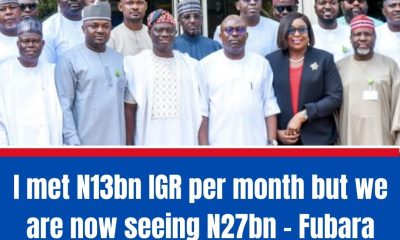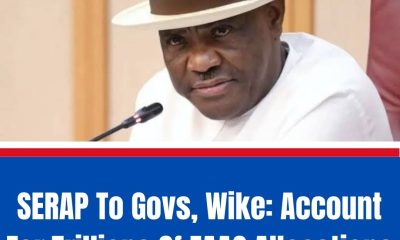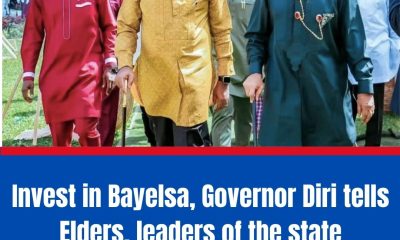News
NO WORK, NO PAY: You have given up your entitlement to wages, Labour leaders, NECA, others tell ASUU

Ibekimi Oriamaja Reports
Academic Staff Union of Universities (ASUU) leaders have been grumbling and protesting over the Federal Government’s seizure of their members’ paychecks since May due to their on-going labor unrest, which has caused the nation’s university system to close for nearly seven months.
However, the Director-General, DG, Nigeria Employers’ Consultative Association, NECA, Wale-Smatt Oyerinde, some Labor leaders, and the DG/Chief Executive Officer, CEO, of Michael Imoudu National Institute of Labour Studies, MINILS, Issa Aremu, consider ASUU’s outburst over the withheld salaries to be inappropriate.
In response, they argued that the government’s action was compliant with the in force legislation, claiming that ASUU’s protest amounted to eating one’s cake and expecting to have it too.
NECA
The director general of NECA stated, “It should be highlighted that fundamentally, pay or wage is predicated on work done, except if such payments are grants, loans, or other payments done at the discretion of the recipient. Employers have a legal obligation, a custom, a right, and a responsibility to give their workers work. Employees are expected to perform the work in accordance with the terms and conditions of employment in exchange for payment.
In the International Labour Organization Conventions 87 and 151, strikes are affirmed as nearly holy, unalienable rights of workers. However, there is no provision in the Conventions that proposes paying employees for work they did not perform themselves. It clearly supports trade union organizing efforts to advance and defend workers’ rights. Therefore, a common misconception is that workers are immune from any negative consequences while they are legitimately on strike. This presumption is false and might be deceptive.
“The Labour Act created provisions for the payment and preservation of employee wages in Nigeria in Sections 1 through 4. Paying compensation for work completed at the designated time is the employer’s responsibility. According to Section 7 of the Labour Act, an employer must disclose to an employee the precise amount of pay to which the employee is entitled.
As a result, during the course of his employment, an employee is entitled to receive his salary, bonuses, and other benefits for the work completed and in accordance with the parties’ agreements. The notion that “a worker deserves his salary” is implied by the principles of natural justice and equitable. The Trade Disputes Act’s Section 43, which acknowledges a worker’s right to resign from employment when negotiations with his employer fail down, also gives the employer the right to withhold the employee’s income for the duration of the dispute. No-work-no-pay was also upheld in decisions made by the National Industrial Court.
“As the economy and business environment becomes more challenging, it has become imperative for actors in the Industrial Relations space to operate within the contexts provided by relevant laws and international Conventions. Adherence to the provisions will substantially reduce the incidence of strikes or other work disruptions, whether legally or illegally.
Corporate wealth and employee welfare can only be guaranteed in an atmosphere that is peaceful and devoid of work disruptions. Once work is disrupted in any form, it compromises the employer’s ability to generate revenue to pay wages and naturally calls into questions the employees’ demand for wages for work not done. Provisions of the Trade Disputes Act mandate parties in dispute to follow through with both the voluntary and compulsory dispute resolution mechanisms, which includes, seeking redress at the Court.”
MINILS
Similarly, Issa Aremu, the DG/CEO of MINILS and a former vice president of the Nigeria Labour Congress, NLC, stated, “Of course the labor law is clear: no work no pay. After lengthy strikes in 2021, President Buhari commendably granted a reprieve to workers in the health sector last year and authorized the payment of striking resident doctors. However, the months-long ASUU strike has regrettably resurrected the no work, no pay controversy.
“Collective bargaining should be supported by all parties, and no work, no pay policies should be avoided. A strike is not a war. We shouldn’t turn workplace conflicts into weapons. Once the parties start communicating and agree to negotiate, antagonism should end.
The government should pay the lecturers for their labor while ASUU should put an end to the strike that has become too compulsive and detrimental to the education sector. The majority of disputes in ASUU are not disputes over rights but rather disputes over interests, such as those involving a new payment system that, in the first place, shouldn’t have resulted in this wasteful industrial war fare. When strikes become about the issues rather than the issues themselves, they are no longer important to the working class! This evolution necessitates ongoing capacity building for all industrial relations stakeholders. A national discussion on “Rethinking Collective Bargaining Process and Strikes” is being planned by MINILS shortly.
Labour officials
Some Labour leaders cautioned that ASUU had pushed the strike too far in their comments on the subject.
According to one of them who requested anonymity, “Trade Unions draw their powers from the existing legislation that initially established them. The “No work, no pay” rule is a part of the current laws, and for emphasis, it is also included in the majority of our Collective Bargaining Agreements, or CBAs.
“What the majority of unions do is ask management to waive this clause in the interest of goodwill following an action. The way ASUU is handling this specific phrase is incorrect because they are misleading the credulous public and asserting it as a right.
Additionally, checkoff dues from members are meant to support them during a strike when salaries are blocked.
Another Labour leader, among others, echoed this sentiment when he said, “The right of a worker to strike or withdraw services is a fundamental human right guaranteed by the Trade Disputes Act, TDA, and the Constitution of the Federal Republic of Nigeria 1999 (as amended). According to Section 42(1)(a), “where any worker participates in a strike, he shall not be entitled to any wages or other remuneration for the period of the strike, and any such period shall not count for the purpose of reckoning the period of continuous employment, and all rights dependent upon continuity of employment shall be adversely affected accordingly.” With such clear legal provisions, it is expected that trade unions that wish to go on strike will push for the implementation of these rights. For situations like this, it is suggested to create a form of “strike fund”.
The National Industrial Court of Nigeria (NICN), which was given exclusive jurisdiction by the Constitution in civil causes and matters relating to or connected with any employment, labor, trade unions, industrial relations, and matters arising from the workplace, the conditions of service, etc., has made a statement regarding this issue.
In the matter of SSANU v. Federal Government of Nigeria (2008), Justice Babatunde Adejumo, President of the National Industrial Court of Nigeria (NICN), stated that Section 42(1)(a) of the TDA is self-executatory. Without more, its execution is not contingent on a follow-up investigation conducted in the manner the appellant suggests. Whether or whether it is legal, a strike is covered by the aforementioned provision and the participants are not entitled to the pay and other benefits that are outlined in the section.
This principle is in line with International Labour Organization (ILO) precedent, which states at para. 588 of the Freedom of Association: Digest of Decisions and Principles of the Freedom of Association Committee of the Governing Body of the ILO, Fourth (Revised) Edition, Geneva, that “salary deductions for days of strike give rise to no objection from the point of view of freedom of association principles.”
According to the Labour leader, “Without trying to be insensitive based on my constituency, it is for the reasons above that the call by ASUU that the Federal Government should not impose the no-work-no-pay rule following the over six (6) months of strike which has left many students and parents frustrated, is unjust and wicked.
“Without taking away the rights of ASUU members to go on strike, the right of the Federal Government to also withhold remuneration should not be thrown away. The quote by Justice Oliver Wendell Holmes, Jr. comes into mind here.
“The choice, of whether or not, to enforce the no-work-no-pay rule is solely at the discretion of the employer who had suffered work stoppage. If it now becomes a right of workers to demand such, we should not be surprised if one day, employers decide to lock out workers and refuse to pay them even though the workers showed up for work.”
Aborisade
However, an activist, Femi Aborisade, while acknowledging the policy of no work, no pay, said “The law on no work no pay says that workers who go on strike and are not working as contractually agreed are not entitled to be paid agreed remuneration. But this is only a one-sided interpretation of the law. The law recognises strike action under certain conditions, particularly, strikes related to dispute of right or strikes caused by violation of collective agreements. Therefore, where workers are compelled to strike on account of non-observance of collective agreements, they would be justified to go on strike and be entitled to their pay. The law does not tolerate slavish conditions of work.
“In the end, the balance of forces always determines whether or not striking workers are compensated. Paying or refusing to pay salaries to striking employees is not governed by legal nuances, but rather by the unwavering resolve and cohesion of the strike force, supported by a resounding majority of the populace, which could result in the political party in power being punished by defeat at the polls.
“The Federal Government has never been able to properly enforce “no work, no pay” on ASUU members precisely because of this. Every time a strike is called off, an agreement that includes a “no victimization” language is inserted since the strikers are determined and have a lot of public support.
-

 Sports6 days ago
Sports6 days agoFA Cup: Man Utd suffer fresh triple injury blow ahead Coventry clash
-

 Business5 days ago
Business5 days agoI met N13bn IGR per month but we are now seeing N27bn – Fubara
-

 News6 days ago
News6 days agoDespite Apology, ABU Zaria Final-Year Law Student Arrested For Defaming Police Officer On Facebook
-

 Politics6 days ago
Politics6 days agoSERAP To Govs, Wike: Account For Trillions Of FAAC Allocations
-

 News4 days ago
News4 days agoCourt orders Becky Buodeigha alias Becky Minaj, CEO of BM Secrets to pay Baraza N7m
-

 Politics6 days ago
Politics6 days ago‘Ondo APC Guber Primary Result already written’ — Aspirant cries out, demands postponement
-

 Business6 days ago
Business6 days agoInvest in Bayelsa, Governor Diri tells Elders, leaders of the state
-

 Politics3 days ago
Politics3 days agoEFCC: I am Ready to Appear in Court But Afraid of Arrest – Yahaya Bello






















